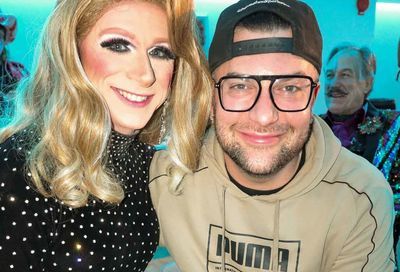Inhuman Conditions
A flawed man tries to reconcile beliefs versus the world in the Holocaust tale 'Either Or'
In recent weeks, those who ride the Metro have invariably come across the large posters advertising an exhibition of human bodies that have been variously dissected and specially preserved. Equal parts anatomy lesson and art exhibition, the show has met with some controversy wherever it has been exhibited. While one is tempted to think that negative sentiments have to do with feelings regarding respect for human life, it is interesting to remember that it was not that many years ago that the work of the artist Damien Hirst, which included a shark floating in formaldehyde and a similarly presented cow head, earned similar, initial consternation.
For some, it is a reaction to what is perceived to be the horrible. The shock of seeing a once-living thing treated in the same manner as an artistic material like clay, a discomfort with the idea that we are all simply an exhibit waiting to happen.
 |
How is it then that we have grown comfortable with preserving other horrors? Why do we feel drawn to not simply acknowledging but examining and exploring some of the most disturbing events in our collective history? Authors write elegantly about child soldiers, documentary filmmakers create lush works about the Spanish Inquisition, and playwrights continue to hold the brutality of the Holocaust up to the light of what we hope is a new day.
In the case of the Holocaust it may be because there are so many stories still not told, so many aspects of this still unfathomable time that demand consideration. Such is the case with the life that inspired Either Or, a play by Thomas Keneally currently having its world premiere at Theater J. Keneally, the Australian-born writer who brought us Confederates, The Great Shame and Schindler’s List, created Either Or to tell the complicated story of Kurt Gerstein.
Born in Germany in 1905, Gerstein was an evangelical and something of a lay-theologian. Devout in his belief in God and endlessly faithful in his belief in the basic good of humankind, Gerstein found himself continuously baffled by the evolution of the Nazi regime. From the elimination of the Evangelical Youth Movement’s Bible Circles to the eventual mass executions of those deemed ”incurable,” Gerstein’s life became one formed by his reactions to a world that was slipping away around him even as he cried for its salvation. A member of the Nazi Party and eventually a member of the Schutzstaffel (SS), the fabric of this man’s personal history stands in decided contrast to his true beliefs and purpose.
Either Or (
The cast is led by Paul Morella who plays Gerstein and carries a great deal of the show’s weight on his shoulders. Overall his is a strong performance though, as the show moves toward its ultimate conclusion, one wishes the actor had been given more opportunities to hold back. For most of Either Or‘s final act, Morella is playing variations on a single highly-strung note and the constancy steals something from the drama the show is attempting to convey. It instead veers dangerously toward an exercise in melodrama.
Meghan Grady brings a fragile grace to the role of Bertha Gerstein, Kurt’s sister-in-law, and is perfectly contrasted by the stoicism of Ralph Cosham as Kurt’s father Ludwig. Attention should also be paid to Elizabeth H. Richards for her fine performance as Kurt’s wife Elfriede.
Most other members of the cast move quite easily through several roles during the course of the play. John Michael-MacDonald and Conrad Feininger slide effectively in and out of the personas of the characters with whom they have been charged.
| EITHER OR To June 3 Theater J 1529 16th St. NW $15-$45 800-494-8497 www.theaterj.org |
Truly, only John Lescault, who is called upon to portray key individuals as diverse as Kurt’s brother and the Papal Nuncio, is lacking. There is something strangely intrusive about his dynamic on the stage, as though he is attempting to forcibly take over the production. He seems almost pointedly to be working outside the ensemble that is carrying the rest of the show cleanly along and the effect is distracting.
To be sure, Either Or is an exhausting and often disturbing play. It forces the audience to bear witness not only to one of the world’s great tragedies but to watch the helpless struggle of a single, flawed and human individual who is trying to both make sense and make a difference. Ultimately, it strives to offer a truth more horrible than we might want to acknowledge, but one we are better for having learned.
Support Metro Weekly’s Journalism
These are challenging times for news organizations. And yet it’s crucial we stay active and provide vital resources and information to both our local readers and the world. So won’t you please take a moment and consider supporting Metro Weekly with a membership? For as little as $5 a month, you can help ensure Metro Weekly magazine and MetroWeekly.com remain free, viable resources as we provide the best, most diverse, culturally-resonant LGBTQ coverage in both the D.C. region and around the world. Memberships come with exclusive perks and discounts, your own personal digital delivery of each week’s magazine (and an archive), access to our Member's Lounge when it launches this fall, and exclusive members-only items like Metro Weekly Membership Mugs and Tote Bags! Check out all our membership levels here and please join us today!



















